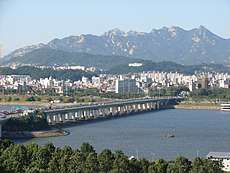Bukhansan
Bukhansan (Korean: 북한산, lit. 'North Han Mountain'), or Bukhan Mountain, is a mountain on the northern periphery of Seoul, South Korea. There are three major peaks, Baegundae 836.5 meters (2,744 ft), Insubong 810.5 meters (2,659 ft), Mangyeongdae 787.0 meters (2,582.0 ft). Because of its height and the fact that it borders a considerable portion of the city, Bukhansan is a major landmark visible from most city districts. The name "Bukhansan" means "mountain north of Han River", referring to the fact that it is the northern border of the city.[2] During the Joseon era, the peaks marked the extreme northern boundary of Seoul.
| Bukhansan | |
|---|---|
.jpg) The three peaks of Bukhansan
 Bukhansan Location | |
| Highest point | |
| Elevation | 836.5 m (2,744 ft) |
| Coordinates | 37.6608°N 126.9933°E |
| Geography | |
| Location | South Korea |
| Climbing | |
| Easiest route | from Bukhansan Ui Station(북한산우이) then walk 2.29km to Bukansan National Park Visitor Center(북한산국립공원백운탐방지원센터) |
| Korean name | |
| Hangul | |
|---|---|
| Hanja | |
| Revised Romanization | Bukhansan |
| McCune–Reischauer | Puk'ansan |
Bukhansan is the highest mountain within Seoul city boundaries. Apart from Bukhansan, there are seven other mountains including Dobongsan and Suraksan that are over 600 meters high within the city.[3]
Popular throughout the year, Bukhansan, and Bukhansan National Park, which was formed in 1983,[4] are renowned for birdwatching, hiking and rockclimbing. Bukhansan attracts a large number of hikers; around 5 million per year.
Name
Since 2002 there has been a movement to revert the name of Bukhansan to Samgaksan. For many years up until now, the three main peaks of the park have collectively been called "Bukhansan"; however, the original collective name of these three peaks was Samgaksan, meaning "three-horned mountain." The head of the Gangbuk-gu District Office in Seoul is leading a petition to have the central government change the name back to the original.[5]
Gallery







 A shrine in Bukhansan
A shrine in Bukhansan
Films and literature
Daum webtoon manwha PEAK by author Hong Sun-soo and artist Im Gak-hyuck is a fictional work based on the mountain rescue team working in this mountain.[6]
References
- "Bukhansan National Park (Dobong) (북한산국립공원(도봉 지구))". KOREA TOURISM ORGANIZATION. Retrieved 27 February 2015.
- "Best Hiking Mountains in Seoul". Visit Korea. Retrieved 17 November 2012.
- "Introduction to Bukhansan". Korea National Park Service. Retrieved 27 February 2015.
- Park, Jin-woo (박진우) (2007-06-14). "북한산, 본래 이름 '삼각산' 되찾아야". Sports Hankook. Retrieved 2007-06-21.
- http://webtoon.daum.net/webtoon/view/peak
External links
See also
| Wikimedia Commons has media related to Bukhansan. |
- Bukhansanseong
- List of mountains in Korea
- National parks of South Korea